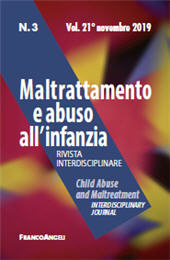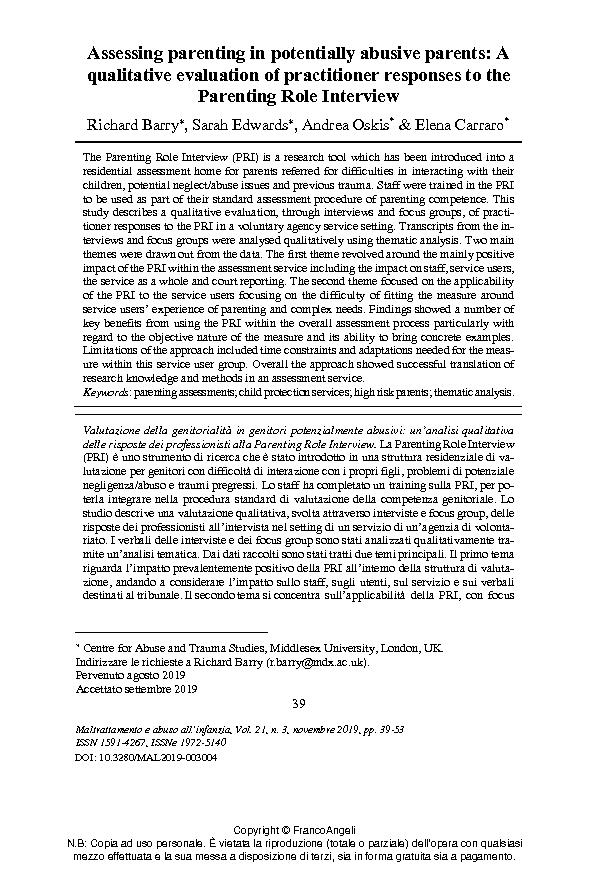Assessing parenting in potentially abusive parents : a qualitative evaluation of practitioner responses to the Parenting Role Interview
39-53 p.
The Parenting Role Interview (PRI) is a research tool which has been introduced into a residential assessment home for parents referred for difficulties in interacting with their children, potential neglect/abuse issues and previous trauma. Staff were trained in the PRI to be used as part of their standard assessment procedure of parenting competence. This study describes a qualitative evaluation, through interviews and focus groups, of practitioner responses to the PRI in a voluntary agency service setting. Transcripts from the interviews and focus groups were analysed qualitatively using thematic analysis. Two main themes were drawn out from the data. The first theme revolved around the mainly positive impact of the PRI within the assessment service including the impact on staff, service users, the service as a whole and court reporting.
The second theme focused on the applicability of the PRI to the service users focusing on the difficulty of fitting the measure around service users' experience of parenting and complex needs. Findings showed a number of key benefits from using the PRI within the overall assessment process particularly with regard to the objective nature of the measure and its ability to bring concrete examples. Limitations of the approach included time constraints and adaptations needed for the measure within this ser-vice user group. Overall the approach showed successful translation of research knowledge and methods in an assessment service. [Publisher's text].
La Parenting Role Interview (PRI) è uno strumento di ricerca che è stato introdotto in una struttura residenziale di valutazione per genitori con difficoltà di interazione con i propri figli, problemi di potenziale negligenza/abuso e traumi pregressi. Lo staff ha completato un training sulla PRI, per poterla integrare nella procedura standard di valutazione della competenza genitoriale. Lo studio descrive una valutazione qualitativa, svolta attraverso interviste e focus group, delle risposte dei professionisti all'intervista nel setting di un servizio di un'agenzia di volontariato. I verbali delle interviste e dei focus group sono stati analizzati qualitativamente tramite un'analisi tematica. Dai dati raccolti sono stati tratti due temi principali. Il primo tema riguarda l'impatto prevalentemente positivo della PRI all'interno della struttura di valutazione, andando a considerare l'impatto sullo staff, sugli utenti, sul servizio e sui verbali destinati al tribunale.
Il secondo tema si concentra sull'applicabilità della PRI, con focus sulla difficoltà di modellare lo strumento sull'esperienza di genitorialità e sui bisogni complessi degli utenti del servizio. I risultati hanno evidenziato diversi vantaggi chiave derivati dall'utilizzo della PRI all'interno del processo di valutazione globale, in particolare per quanto riguarda la natura oggettiva dell'intervista e la sua abilità di fornire esempi concreti. Tra i limiti dell'approccio sono da citare i vincoli temporali e gli adeguamenti necessari per utilizzare lo strumento sullo specifico gruppo di utenti. Complessivamente, l'approccio ha mostrato un'efficace traduzione pratica della conoscenza e del metodo di ricerca in un servizio di valutazione. [Testo dell'editore].
-
Articles from the same issue (available individually)
-
Information
ISSN: 1972-5140
DISCIPLINES
KEYWORDS
- Interviste di valutazione, trauma infantile, genitori ad alto rischio, servizi
- Parenting assessments, child protection services, high risk parents, thematic analysis



